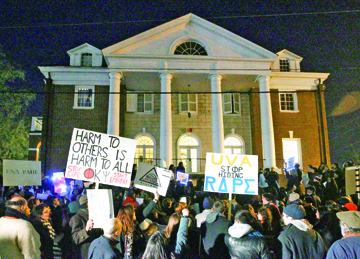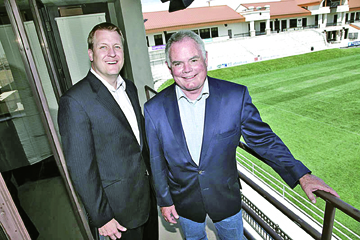
by Mark Smiley | Apr 24, 2015 | Main Articles
by Danny Foster, Esq.
the managing partner of the law firm Foster, Graham, Milstein & Calisher, LLP
Recently the Denver District Attorney’s office, along with the city of Denver, unveiled their decision to participate in a public relations program sweeping the nation called “Start by Believing.” For those of you who are unfamiliar with the program, let me explain. “Start by Believing” is a campaign designed to encourage everyone (civilians, politicians, police, prosecutors, jurors, everyone) to immediately believe any person who claims to be a victim of a sexual assault as soon as they tell you they have been victimized. It doesn’t say “Start by Listening” or “Start by Supporting” it says “Start by Believing” them.
Yes, you read that correctly. The city of Denver and the Denver DA have decided that it is more important to believe any person alleging sexual abuse than to provide an alleged suspect the presumption of innocence. The concept of believing an alleged victim without any investigation specifically means that we must NOT believe the person accused of committing this act and presume them guilty. You can’t have it both ways. What a frightening concept. I am cynical by nature so it’s not a huge surprise that prosecutors’ offices across the country would embrace this notion. It makes it easier to secure convictions if there is an overwhelming PR campaign to bolster the credibility of victims. But when the city of Denver itself gets behind this concept and spends city funds on this issue to promote this unconstitutional concept, it causes me and many of those in the legal community great concern.
I want to stress that there are many real victims of sexual abuse. And, for those poor individuals who have been victimized, it is essential that we support them, help them and be there for them during the healing process. I have no doubt that many victims stay silent for fear of being blamed or not being believed. But this “Start by Believing” campaign is not the appropriate remedy to handle this problem. All too often we deal with cases where a “victim” says she was victimized only later to discover she lied for any myriad reasons, but by that time the damage has been done to the person who was charged with the crime. Once you are accused of being a sex offender you can never remove that label. That’s the term that sticks, even if acquitted of any wrong doing. That’s what happens when we “Start by Believing.” In my mind, there is only one type of person lower than the sexual offender, and that is the person who lies about being sexually assaulted and completely ruins an innocent person’s life. If you don’t think that happens, then all you need to do is look at the catastrophe on the University of Virginia campus this past year where a salacious allegation of sexual assault was levied against several members of a fraternity house. If it wasn’t for damn good legal investigation (NOT the investigation by Rolling Stone magazine) the “victim” would have gotten away with her lies and many young mens’ lives would have been ruined. These poor young men were eviscerated in the press, on campus and scared to death they could end up in prison for life. Frightening things happen when we “Start by Believing.”
Should the police and University have started this criminal investigation by “believing” the alleged perpetrators? Of course they should have. The Constitution demands that all people be considered innocent until proven guilty. Did the University of Virginia investigators start by “believing” the alleged victim instead? Of course they did. Why? Because it’s politically unpopular to ever question anyone who alleges being the victim of sexual assault. I get it, I understand the need for politicians and TV commentators and university officials to look tough on sex offenders. But this type of action CANNOT happen at the expense of violating suspects’ Constitutional rights.
Our office recently sponsored a free seminar to help prepare young men who are graduating high school in the spring and starting college in the fall. While a lot of the discussion revolved around the dangers of drugs/alcohol, the bigger concern was about how dangerous the climate is for young men on campuses across the country where even the slightest ambiguity regarding consensual sexual contact can equate to expulsion and criminal prosecution. I cannot sit idly by and watch more good kids get prosecuted and expelled for false sexual assault allegations. My colleagues and I believe this is absolutely our duty as lawyers to warn these boys about what could happen to them and how to avoid many of the pitfalls we have seen in the past. We have had to defend too many good people from outrageous allegations. While it would be nice if our seminar guaranteed they will avoid trouble, unfortunately it doesn’t work that way. All we can do is arm them with some useful information that we hope will give them an advantage. If you are a male, or have a son or grandson, BE FOREWARNED, men (and more specifically younger college age men) are in the crosshairs of an aggressive campaign led by victims’ advocate groups, prosecutors and the pandering politicians, to prosecute anyone who is even alleged to have committed a sexual crime. In Colorado that can equate to a life sentence in prison. And for those of you who don’t practice law, you should know that Colorado has a law called the Rape Shield statute. It prohibits an accused from mentioning anything to a jury about the alleged victim’s sexual past, even if the alleged victim has made false rape accusations in the past! The time has come to repeal this very dangerous statute.
Our firm has recently filed a lawsuit against a “victim” of sexual assault on the Boulder campus. Our investigation not only proved my client’s innocence, but the Boulder DA filed false information charges against the woman who lied to the police. She was convicted and now she can defend her actions in a civil lawsuit. She never even apologized to my client for what she put him through. No matter how much money we obtain from her, I don’t think it will ever even out the damage she caused by her accusations. Thankfully the Boulder DA didn’t “Start by Believing.” He started by doing what he is supposed to do, he started by investigating.
So, “Start by Believing?” How about “Start by Supporting” people who allege being victimized. “Start by Listening” to those who allege sexual assault. “Start by Loving” your kids and being there for them. And “Start by Investigating” the allegations of those who claim to be victims. But only Believe them when the weight of evidence points to guilt beyond a reasonable doubt, just like the Constitution requires.
Danny is a managing partner of Foster, Graham, Milstein & Calisher (FGMC). His practice focuses on personal injury. The law firm of FGMC, located in Cherry Creek, is a full service law firm focusing on: criminal defense, personal injury, real estate, litigation, liquor licensing, construction law, tax/estate planning, bankruptcy and zoning. This article does not create an attorney-client relationship and is for informational use only (what do you expect from an attorney!)

by Mark Smiley | Apr 24, 2015 | Main Articles
Development Along Cherry Creek Comes To Fruition
by Charles C. Bonniwell
 It has been almost a fifth of a century in the imaging and planning but at long last a spectacular entertainment district along Cherry Creek from Colorado Boulevard to South Cherry Street appears to becoming a reality. The city held a press conference at Infinity Park in which the project principals were introduced and the newest vision outlined by Mayor Mike Dunafon and Deputy City Manager Linda Cassaday. Dunafon indicated the project was intended to augment and assist the entire area rather than compete with Cherry Creek and 9th and Colorado Boulevard.
It has been almost a fifth of a century in the imaging and planning but at long last a spectacular entertainment district along Cherry Creek from Colorado Boulevard to South Cherry Street appears to becoming a reality. The city held a press conference at Infinity Park in which the project principals were introduced and the newest vision outlined by Mayor Mike Dunafon and Deputy City Manager Linda Cassaday. Dunafon indicated the project was intended to augment and assist the entire area rather than compete with Cherry Creek and 9th and Colorado Boulevard.
Revised Plans
A little over three years ago Glendale applied for an $80 million tourism subsidy from the state under the Regional Tourism Act for its $360 million Riverwalk project. The application was turned down along with other small county and city projects for the highly controversial $800 million Gaylord Entertainment project in Aurora. That award for the Gaylord project was widely perceived as resulting from a rigged process and continues today to be mired in litigation. After the Regional Tourism Act rejection Glendale had to go back to the drawing board.
The revised project along Cherry Creek has a budget of $175 million of which the city will provide approximately $75 million for roads, creek edge treatments and in particular a parking garage as well as surface and underground parking.
What makes Glendale 180 somewhat unique is the fact that there will be no apartment houses or condominiums involved as a standard method of increasing the rate of return in mixed use projects in Colorado. The mayor pointed out that housing has proved a major impediment in many entertainment projects as residents soon fight to lessen the noise and traffic impacts.
New Name And Parking
 The somewhat quixotic name “Glendale 180” is an oblique reference to the fact that Glendale in the 1970s and 1980s had one of the most vibrant entertainment areas in Colorado. The city fathers in the 1990s slowly destroyed the entertainment area to the enormous benefit of Denver’s LODO area. Thus “Glendale 180” is a type of homage to the phrase “back to the future” made famous by the 1985 movie by that title.
The somewhat quixotic name “Glendale 180” is an oblique reference to the fact that Glendale in the 1970s and 1980s had one of the most vibrant entertainment areas in Colorado. The city fathers in the 1990s slowly destroyed the entertainment area to the enormous benefit of Denver’s LODO area. Thus “Glendale 180” is a type of homage to the phrase “back to the future” made famous by the 1985 movie by that title.
The 22 acre project will have 303,225 total leasable square feet including 109,000 anticipated for entertainment, 151,725 feet for food and beverage and 42,500 for retail. By way of comparison the Cherry Creek Shopping Center has a gross leasable area of 1,032,000 square feet.
A key to the success of Glendale 180 according to city officials will be the existence of ample parking. The city will provide 2,270 public parking spaces including 454 underground, 506 surface parking and a parking structure containing 1,310 spaces. Nearby Cherry Creek North has only 555 public parking spaces all on-street along with private parking.
Spokespersons For Developer And Architect
The developer of the project will be Wulf & Co. a commercial and retail real estate firm centered in Houston, Texas, founded in 1985. Bob Sellingsloth, the president of Wulfe & Co., spoke at the Infinity Park even t praising the city for its forward looking perspective. He noted that at first his firm was unsure of the naming of the project Glendale 180 and so it had a survey done which proved that the name was in fact highly effective.
t praising the city for its forward looking perspective. He noted that at first his firm was unsure of the naming of the project Glendale 180 and so it had a survey done which proved that the name was in fact highly effective.
David Glover on behalf of the project architect, Gensler, spoke eloquently about the desire for the project to bring a vibrant sense of city to the area. He noted that 40 percent of the public surveyed indicated a sense of loneliness in today’s modern society. His design is intended to bring a feeling of light and air as well as “being a place for maximum happiness.”
Glover also indicated that Glendale 180 will be divided into three areas. The area nearest Colorado Boulevard will be known as the “Promenade” while the central area will be entitled the “Meadow” and the area adjacent to South Cherry will have the title the “Mountain.” He noted that if you valet your car you can have it delivered back to you anywhere along the project.
Common Consumption

Patrons will be able to walk from bar to bar with their beverage under the common consumption law.
The city helped pass, at the Colorado legislature, a common consumption area law with Glendale 180 in mind. The law allows patrons to go from bar to bar and long the sidewalks with open containers.
Among the remaining challenges is securing the parcels along East Virginia not owned by the city including the Staybridge Suites Hotel on East Virginia and the property along Colorado Boulevard and east owned by M.A.K. Investment Group, LLC who acquired it in 2006 from the O’Conner family. The city is in negotiations with both property owners and ultimately has the power of eminent domain as the land is part of an urban renewal district.
Suites Hotel on East Virginia and the property along Colorado Boulevard and east owned by M.A.K. Investment Group, LLC who acquired it in 2006 from the O’Conner family. The city is in negotiations with both property owners and ultimately has the power of eminent domain as the land is part of an urban renewal district.
City Officials
 Overseeing the project for the city are Deputy City Managers Chuck Line and Linda Cassaday who were designated as officers for the urban renewal district titled Glen Echo. Line noted that for himself and Cassaday the project will mean long hours in addition to their normal duties, “but it is an incredibly exciting and fun project to work on.” Cassaday stated to the audience that the announcements on new tenants for Glendale 180 will be featured on its website at www.glendale180.com. Leasing on the project is being headed up by the Denver-based firm The Laramie Company and its leasing agent Mary Beth Jenkins.
Overseeing the project for the city are Deputy City Managers Chuck Line and Linda Cassaday who were designated as officers for the urban renewal district titled Glen Echo. Line noted that for himself and Cassaday the project will mean long hours in addition to their normal duties, “but it is an incredibly exciting and fun project to work on.” Cassaday stated to the audience that the announcements on new tenants for Glendale 180 will be featured on its website at www.glendale180.com. Leasing on the project is being headed up by the Denver-based firm The Laramie Company and its leasing agent Mary Beth Jenkins.
Groundbreaking for Glendale 180 is scheduled for the fall of this year with the opening of the project in early 2017.

by Mark Smiley | Mar 27, 2015 | Main Articles
Little Known Treasury Dept. Anti-Money Laundering Scheme
Destroys Some Family Dreams In Cherry Creek Valley
by Charles C. Bonniwell
The housing market in the Cherry Creek Valley is hot and getting hotter. But finding a home one can reasonably afford in today’s market may only be a part of the challenge. Pursuant to a little kno wn 2012 edict the United States Treasury Department quietly imposed a massive far-reaching program purportedly to address money laundering concerns. It has in fact destroyed some innocent families’ best laid plans and created a paperwork nightmare for many people trying to buy a home or refinance one.
wn 2012 edict the United States Treasury Department quietly imposed a massive far-reaching program purportedly to address money laundering concerns. It has in fact destroyed some innocent families’ best laid plans and created a paperwork nightmare for many people trying to buy a home or refinance one.
Joe Metzler a mortgage specialist who heads Mortgages Unlimited in St. Paul, Minnesota, declared: “Even if you are the most perfect [borrower] expect that you might still get singed going through.”
Public Misconception And Misery
Many potential borrowers mistakenly believe their documentation quagmire is due simply to lenders tightening loan guidelines after the mortgage implosion in 2008 resulting from loose loan standards. The tightening of actual loan standards would have been relatively simple. Instead much of the paperwork debacle is caused by a federal agency (the Treasury Department) which has a totally different agenda i.e. preventing the laundering of money that has not been subject to being fully and completely taxed. The Treasury Department has no reason to disabuse the public of its misconception and the Treasury Department’s hidden role in their misery.
Justin Petrochko, events manager for non-profit Project Angel Heart, noted that the massive paperwork demands of the Treasury Department almost prevented him and his wife Marissa from acquiring a home. Petrochko stated, “If it were not for Marissa working from home for a couple of days a week for several weeks the home buying process would not have happened for us. I don’t know how many families satisfy the demands and of course many end up not being able to buy a home.”
a home. Petrochko stated, “If it were not for Marissa working from home for a couple of days a week for several weeks the home buying process would not have happened for us. I don’t know how many families satisfy the demands and of course many end up not being able to buy a home.”
The executive editor of the Chro nicle Mark Smiley had applied for a refinance of his home in Mayfair. “I thought it would be a simple process. We easily qualified for the loan and had more than sufficient equity in the house. Was I ever wrong. It was absolute torture. No matter what documents we provided there were ever increasing and endless and sometimes duplicative demands for items that had nothing to do with the underlying transaction but apparently for fear of rules and regulations from Washington.”
nicle Mark Smiley had applied for a refinance of his home in Mayfair. “I thought it would be a simple process. We easily qualified for the loan and had more than sufficient equity in the house. Was I ever wrong. It was absolute torture. No matter what documents we provided there were ever increasing and endless and sometimes duplicative demands for items that had nothing to do with the underlying transaction but apparently for fear of rules and regulations from Washington.”
Smiley grimaced, “My parents gave us a $100 check to buy their granddaughter a birthday gift. It was required that I provide a letter from my parents declaring the reason and purpose of the gift. My parents were traveling so I had to reach and have them overnight the letter. We had scores and scores of demands that had absolutely nothing to do with our ability to repay the loan.”
Smiley, in fact, eventually gave up. “I called my lender and said ‘I’m done. I am not going to provide one more lousy additional document.’ I politely told the lender you can take your loan and shove it.” Fear of losing a valued and qualified customer resulted in higher ups at the bank waiving some of the more ridiculous paperwork requirements and Smiley did eventually close the loan, but the affair did not leave him happy. “As far as I am concerned the U.S. Treasury Department should be officially designated a ‘terrorist group’ for what they are doing to everyday families across America.”
Concerns Over Treasury Department
Homebuyers are not the only ones upset with the Treasury’s ever more intrusive anti-money laundering activities. The publication American Banker reported late last year in an article titled “Treasury, FinCEN Try to Quell Fears over Money-Laundering Enforcement” reported that “banks were cutting ties with entire business sectors such as check cashers and money transmitters, because of a blunt governmental approach to stamping out money laundering.”
The ever growing and more intrusive federal anti-money-laundering project began simply enough in 1970 with “The Currency and Foreign Transactions Reporting Act” (better known as the “Bank Secrecy Act”) which required banks to report cash transactions exceeding $10,000. The program went on steroids with the provisions of Title III to the USA PATRIOT Act of 2001 in response to the events of September 11, 2001, and the attack on the World Trade Center Twin Towers.
In 2012 the Treasury Department through its Financial Crimes Enforcement Network (“FinCen”) issued a rule that required even non-bank residential mortgage lenders and originators to establish anti-money laundering (AML) programs and report so called suspicious activity reports (SARs). That required at a minimum (1) the development of internal policies, procedures and controls, (2) the designation of a compliance officer, (3) an ongoing employee training program and, (4) an independent audit function to test programs.
Failure to comply with a FinCEN rule subjects a person to possible violation of the USA PATRIOT Act with the imposition of major fines ($25,000) and imprisonment of up to five years. Experts estimate that all of the Treasury’s anti-laundering requirements including the more recent mortgage rules result in a drain of hundreds of millions from the United States economy in compliance and enforcement with little or no actual benefit as criminal money launderers simply shift their activities to other areas. FinCEN has also made an effort to go after even the smallest of businesses. It recently announced with great fanfare regarding Colorado, a $75,000 civil money penalty against a tiny cash checking company, Aurora Summit, Inc., for not complying with its mandates.
Fannie Mae Requirement
Many of the requirements that drive potential buyers crazy are issued by Fannie Mae (the Federal National Mortgage Association) which is the largest investor of mortgages in the country. Fannie Mae decides what documentation it requires for a mortgage to be considered qualified for purchase.
For example Fannie Mae requires that all funds used for down payment, closing costs and financial reserves come from acceptable and verified sources as a way to comply with the anti-money laundering of the Treasury Department. As a practical matter it means that all so-called “large deposits” are verified as coming from acceptable sources. Large deposits are in turn defined so that they include transactions no ordinary person would define as “large.” Under Fannie Mae’s rules any deposit in excess of 50 percent of a borrowers “qualified income” is declared to be “large.” Thus if a borrower has qualified income of $3,500 per month, any deposit of $1,650 is potentially a large deposit and the mortgage company will demand the source of all of those funds down to the least significant check.
While the provisions in Fannie Mae’s Section B3-4.2, Verification of Depository Assets, would provide certain leeway in issuing verification demands, that is not what happens in the field. A company’s local compliance officer is often a low paid staff member who greatly fears a governmental audit which could destroy his or her life. They in turn err at their company’s urging on the side of caution and make ever greater demands. In the case of the Chronicle’s Mark Smiley, consulted experts could not pinpoint any specific rule or regulation that would cause that a single $100 check deposit from a parent to generate a demand for verification other than the general fear generated by the Treasury Department and FinCEN.
Treasury View Of Public
A small mortgage lender who asked for anonymity for fear of attracting undue federal attention stated, “The federal anti-money laundering scam has become a bureaucratic beast that is ripping apart the fabric of the home mortgage business as well as other whole sections of the banking industry. It was Republicans that gave us the Bank Secrecy Act and the USA PATRIOT Act and it is a Democratic administration that has come up with these most recent inane requirements under an out of control Treasury Department. As far as the Treasury Department is concerned the members of the American public are sheep to be sheared and they simply don’t care how bloody the shearing is.”

by Mark Smiley | Mar 27, 2015 | Main Articles
State Treasurer And Adams County Judge Raise Additional Problems
by Charles C. Bonniwell
 The star-crossed Gaylord Rockies hotel project appears to be running into continued turbulence. Originally envisioned to be part of the relocated and expanded National Western Stock Show complex, the Aurora hotel and convention site has gone through a seemingly never ending series of complexities, alterations and controversies.
The star-crossed Gaylord Rockies hotel project appears to be running into continued turbulence. Originally envisioned to be part of the relocated and expanded National Western Stock Show complex, the Aurora hotel and convention site has gone through a seemingly never ending series of complexities, alterations and controversies.
Back in the spring of 2011, Nashville-based Gaylord Entertainment announced it was building a new Gaylord Western Hotel and Convention complex at the High Point site near Peña Boulevard and Tower Road. It was to be next door to the new home of the National Western Stock Show which was going to move from its Denver home after 105 years. Initially supported by then new Denver Mayor Michael Hancock the move of National Western was squashed by a revolt of the City Council, led by Councilman Charlie Brown.
Gaylord Entertainment nonetheless demanded massive tax concessions from the City of Aurora and the State of Colorado totaling over $380 million for the $800 million project. As outlined by the Glendale Cherry Creek Chronicle in April through June of 2012, Gaylord Entertainment being awarded over $81 million in state tax subsidies appeared to be part of what some called a rigged process by the Colorado Economic Development Commission. Under the Colorado Regional Tourism Act (the “RTA”), small cities and counties were supposed to be able to compete in an aboveboard process for the best projects pursuant to the criteria set out in the RTA. Small towns, including Glendale, and counties were forced to spend hundreds of thousands of dollars to submit applications in which they apparently had little or no chance of being awarded a grant.
The project became enmeshed in further controversies when just after the award of the state subsidies, Gaylord Entertainment announced it, in fact, had no intention of building the hotel and was getting out of the development business, a fact it kept from the commission. It sold its interest in the hotel project and the tax subsidies to Houston-based RIDA Development Corp.
In September 2013, 11 Front Range hotels sued the Economic Development Commission and the City of Aurora in Denver County District Court to vitiate the state award. The lawsuit was dismissed the following spring. Aurora in turn sued the Front Range hotels in Arapahoe District Court asserting that the action by the hotels delayed the funding of the project and constituted tortuous interference, but that suit was in turn dismissed in the fall of 2013.
In the fall of 2014 two residents of Aurora filed suit in Adams District court challenging the validity of Aurora awarding $300 million in subsidies to the hotel project. In February 2015, Adams County District Court Judge Ted C. Tow III voided the Tabor election set up by the City of Aurora whereby the only allowed voter was an employee of the landowner. The court indicated that a city-wide election would likely have to be undertaken. Within hours of the decision, Aurora filed an appeal of the decision to the Colorado Court of Appeals.
As a result of the Court ruling Colorado Treasurer Walker Stapleton asked the Legislative Audit Committee to examine whether the state should honor the subsidies awarded by the Colorado Economic Development Commission. Stapleton also sent a letter to the Colorado Office of Economic Development and International Trade asking why the EDC offered the incentives in the first place given they may not in fact need the subsidies and proper financing documents may not have been submitted.
Aurora Mayor Steve Hogan promptly fired off an angry letter to Walker Stapleton saying the issues raised by his office had already been “discredited” years before. He went on to declare, “What is concerning to me is that your letter seems not only politically motivated but ill-informed.” He then opined, “It seems an inappropriate role for the Office of the State Treasurer to involve itself in a commercial dispute that is before the courts.”
Despite all of the continued controversies, developer RIDA Development Corp. and the City of Aurora seek to give the impression of continued progress. RIDA announced in February that the hotel and convention complex would feature a massive indoor and outdoor water park. Westword and other publications ridiculed the water park concept for a hotel project in Aurora.
Aurora Mayor Hogan in turn, told the Economic Development Commission that the Gaylord project would break ground between October and December of this year. This will only be possible provided it wins its appeal to the Colorado Court of Appeals on the issue of the Tabor election.
Observers indicate that the enormous time, effort and resources for the Gaylord hotel and convention center put in by Aurora’s Mayor Steve Hogan could show him to be a political leader in the mode of DeWitt Clinton of New York whose vision and determination made possible the key transportation project of the early 19th century — the Erie Canal. Others view him more as a Captain Ahab driven to capture a white whale of a development project that will seriously damage the future economic progress of the City of Aurora. Only time will tell which caricature of him is closest to the truth, but crunch time for helping to make that determination is fast approaching.

by Mark Smiley | Feb 26, 2015 | Main Articles
Planning Board Approves Development; Showdown Is March 31 Before City Council
by Glen Richardson
A storm is brewing in Denver’s Crestmoor neighborhood. Up in arms over the latest development proposed at the Mt. Gilead Church property, residents from Crestmoor, Lowry and surrounding neighborhoods packed Eisenhower Chapel Jan. 6 hoping to ward off a zoning change proposed by Metropolitan Homes. Then during a Feb. 1 snowstorm, many demonstrated in front of the church property. Finally on Feb. 10 Councilwoman Mary Beth Susman facilitated a meeting between neighborhood leaders and Metropolitan Homes to see if the parties could find common ground. The developer did make concessions but did not alter plans for density and other issues.
Peter Kudla, founder of Metropolitan Homes, is seeking the zoning change so he can build a 120-unit, three-story apartment complex on the 2.3-acre site at Cedar and Monaco. The change in zoning would increase the density from 2.6 units per acre or about one home on each one-third acre to a density of 52 units per acre. Before it was finally dropped, the Alpert-Eisen development proposed for the same property eight years ago and widely covered by the Chronicle (July and August 2007) ended up being about 56 units.
The Denver Planning Board on Jan. 21 voted to approve the zoning change in the neighborhood of single-family homes despite opponents outnumbering supporters during the six-hour hearing. Planning Board members did express uneasiness about the proposal but said they were not allowed to consider potential problems to traffic due to inadequate parking or safety issues. If the rezoning passes the City Council’s Neighborhood & Planning Committee, first reading by the full City Council was scheduled for March 2 (no public testimony is allowed) followed by a second reading and public hearing set for March 31, 5:30 p.m.
Density, Parking Issues
Kudla purchased the property in October of last year for $1.8 million. The majority of residents in attendance at Eisenhower Chapel argued that the proposed increase in density would have a profound impact on the amount of traffic within the Crestmoor and Lowry residential neighborhoods. “The project will provide inadequate parking. The city allows fewer parking spaces in areas with good transportation options. We don’t have that option here,” declared one attendee. “Auto traffic will increase and more commuters will use side streets around Crestmoor Park as they try to avoid traffic congestion at Alameda and Monaco. Also, Crestmoor Park is used a great deal by children and families,” added another.
Residents also noted that the proposed zoning (S-MU-3 or a multi-unit three-story) does not limit the number of units a developer can put on a property. “Once the zoning is changed, if the zoning transfers with the sale of the property the new owner can do any number of units without seeking input or approval from residents,” one person warned.
Several of those in attendance noted the area is zoned for single-family homes and there is no compelling need to change the zoning. “Crestmoor is formally designated as an Area of Stability within Blueprint Denver, not an Area of Change,” someone else pointed out.
The church property itself also became a point of contention. A resident living next to Crestmoor Park in the patio homes behind Mt. Gilead Church argued in favor of the proposed development, suggesting the church was an eyesore. Another Crestmoor resident said, however, that the church had historic significance and should be registered as a historic place.
Feb. 10 Face-off
At the Feb. 10 meeting representatives from the Englewood-based development company refused to reduce the density of their proposed apartments. The developer has decided to allow additional parking and fewer two-bedroom units, but insists on building a 120-unit complex. Kudla now says they would build 50 two-bedroom and 70 one-bedroom units. Furthermore Kudla representatives said they would not consider building any kind of for-sale product including condos, townhomes or patio homes.
“We participated in good faith and were eager to negotiate,” attendees at the Feb. 10 meeting told the Chronicle. “We hoped that leaders from Metropolitan Homes would come to the table willing to offer neighbors a more appropriate project, but unfortunately they would not alter their plans for the proposed density and are not willing to consider anything but rentals.”
At that meeting Kudla representatives told the neighborhood group they will proceed with their application for a zoning change before the Denver City Council. The Crestmoor group says, however, the developers do not have the zoning that entitled them to build the project. “We can stop them if neighborhood residents tell City Council members that they don’t want this project. We think we can do much better than a 120-unit apartment complex.” They admit, nevertheless, that the March 31 hearing is critical and urge community members to attend and speak up.

by Mark Smiley | Feb 26, 2015 | Main Articles
by Glen Richardson
Perhaps the biggest fight in the upcoming Denver municipal election is in the 4th Council District where Councilwoman Peggy Lehman is term limited. While there are five candidates for the council seat, it appears to be coming down between two women, Halisi Vinson and Kendra Black, who represent dramatically different interests. To date the other candidates have not raised sufficient funds to get a strong political message out.
The 4th District is the southeast portion of the city from East IIiff Avenue on the north down to Belleview Avenue, and includes the neighborhoods of Wellshire, University Hills, Goldsmith, Hampden, Hampden South, Kennedy and Southmoor Park. (See map on Page 19.)
Black is viewed by Webb supporters as a candidate being wholly under the control of real estate developers and initiators of the destruction of the Hentzell Park natural area in the District that raised an uproar by citizens.
Halisi Vinson on the other hand is being backed by park advocates including former Denver Mayor Wellington Webb. The former mayor sent a blistering e-mail to interested parties throughout the 4th District and elsewhere declaring in the opening sentence: “First they took our park and now they want to buy a council seat.” (See the full letter on Page 3.)
He goes on to note, “What residents of District 4 need to be aware of is that Halisi’s opponent is taking thousands for her campaign from those who took the park. They even rejected your signatures calling for a public vote on taking the park land, which has been officially called a park since 1955.”
The e-mail has set off a firestorm of debate not only in the 4th District but across the city.
Black was the co-chair of the highly controversial 15 member oversight committee appointed to oversee the funds of the $466 million bond issue approved by voters in November 2012. Critics accused Black and her fellow committee members as being little more than “a rubber stamp for the district’s spending plans” according to the website Chalkbeat Colorado.
Among Black’s numerous endorsers and money contributors are Lisa Dannemiller, the disgraced Denver Park Manager who orchestrated the destruction of the Hentzell Park Natural Area for Mayor Michael Hancock. She oversaw the removal of longtime park advocates from the Park Advisory Board who opposed the mayor’s plans.
Another higher controversial contributor is Marcus Pachner. A lobbyist and political fixture, Pachner was paid by the International Risk Group to help smooth over the selling of 80 acres of Lowry Vista open space to the developer for $10 for massive mixed use development that outraged citizens in the 5th District. The appearance of Pachner on the money donation list of Black has drawn the ire of park advocates in the 5th District.
Additional endorsers include wealthy attorney Steve Farber whose law firm Brownstein Hyatt Farber Schreck LLP is widely despised by good government advocates but represents many of Colorado’s most powerful real estate developers, and CRL Associates another influential Denver lobbying firm for developers.
Webb admirer and park advocate Trish Abbott said, “Ms. Black’s endorsers include a rogue’s gallery of some of the greediest individuals in all of Denver. If she gets in office she will let them destroy the district so it will be unrecognizable in four years.” Webb noted in his e-mail, “ïf they get away with this, the rich and powerful will try to take other parks and buy our council seats.”
Another park advocate Richard Witholder urged District voters to go to Black’s website and review the Issues section where she refers to herself in the third person as in “We are fiscally responsible.” The fact she uses the royal “We” tells you everything you need to know about her.
She went on to note, “With Kendra Black you can say goodbye to any parks and open space in the District that the developers can grab along with massive high rises in local residential neighborhoods. Just look what they have done to Cherry Creek North, Lowry and Crestmoor. These fat cats and neighborhood busters are not giving her all this money for nothing.”
Other Vinson supporters note that Black appears to have little or no business experience other than her assertion of “witnessing my husband’s 25 years in small business.”
Webb in turn noted that Vinson is a fierce advocate for parks who has an MBA and 30 years of corporate and venture capital experience. Vinson states, “I will be dedicated to making sure that we maintain what we love about Denver, like our open spaces and parks, in the midst of change.” She is a member of the Hampden Heights Civic Association. She is married to Ric Crawley a former firefighter and city employee.
A review of the Candidate Financial Dis-closure Statements for “Halisi Vinson for Denver” show the largest contributors to her campaign to date are Christopher Dinkel, a Denver immigration lawyer, for $940; The Holt Group, a Denver law firm, for $1,000 as well as Mary Holt for $1,000 and Ty Holt for $500. Keith Kegley a Los Angeles IT entrepreneur for $1,000; Arthur Suazo a principal in Hudson Pacific, a commercial real estate firm in Los Angeles, for $1,000; and Crews of California, an airport gift shop in Las Vegas, for $1,000.
Black graduated from Thomas Jefferson High School, as did Vinson’s son.
The supporters of Black, including Jeff Allen the COO of the Greater Glendale Chamber of Commerce, argue that Black has broad support and “she represents many diverse interests and she wants to represent all Denverites to make the city a better place to live in and work.”
Another supporter of Black, former Denver City Councilman Ed Thomas, noted that “real estate developers are important stakeholders in Denver and they deserve advocates like Kendra Black on the City Council to represent theirs as well as other business interests.”
A third supporter who did not want to be identified by name went on to declare, “What right does Wellington Webb have to tell us in the 4th District how to vote? Black has lived in this district most of her life and Webb has never lived within the District’s boundaries ever. He just wants to control everything.”
Both Black and Vinson have sought the endorsement of the AFL-CIO labor union which has not endorsed any candidate in the 4th District to date.
Given the wealth and influence of supporters of Kendra Black observers view her as the odds-on favorite for the council seat, but Vinson appears to be gaining a surprising amount of grassroots support according to activists in the 4th District who see a possible upset in the making.
The first round of the Denver municipal election is scheduled for May 5 and if no candidate gets a majority of the votes a runoff between the top two candidates will be held on June 2.
















